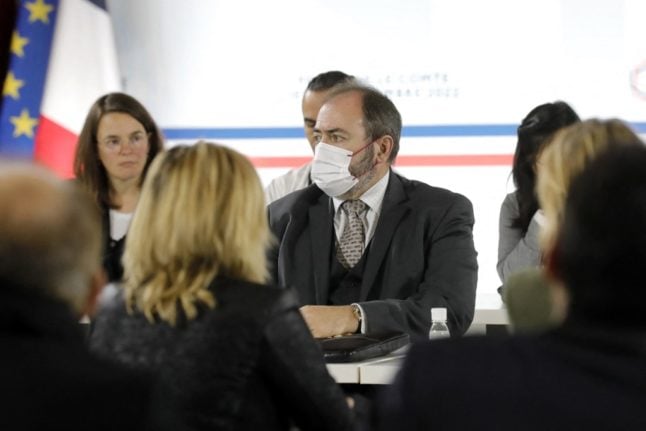French Health Minister François Braun held a press conference with other public health officials on Friday to provide the public with the government’s latest public health advice.
Earlier in the day, the French health minister said on BFMTV that fourth doses of the Covid-19 vaccine were available to all groups. Previously, only at-risk populations were eligible.
READ MORE: Can anybody in France now get the latest Covid booster vaccine?
Here is what the public health officials said:
The situation
Health Minister Braun began the press conference by reminding the public that France is facing a “triple epidemic,” as the nine Covid-19 wave occurs alongside seasonal illnesses of influenza and bronchiolitis. Specifically, the health minister said that hospital emergency room visits and hospitalisations for the flu had doubled in the last week.
Therefore Braun called for voluntary acts of “solidarity” to prevent a rise in cases and serious infections, particularly of Covid-19, during the end-of-year festivities.
According to Braun, France counted more than 100,000 new Covid-19 contaminations in recent days, with more than 1,000 patients being treated in critical care services.
Wearing a mask
The public officials reminded the public that wearing a mask is an “act of solidarity.” While the mask is not required, it is highly recommended, particularly in “crowded and enclosed areas,” such as public transportation.
Minister Braun encouraged wearing a mask when travelling to Christmas holiday celebrations this year.
“You do not know if the person next to you is immune-compromised,” said COVARS head Brigitte Autran, recommending that people wear masks while travelling.
Braun also mentioned that in nursing homes and care centres, masks could become required, at the behest of the establishment’s management.
Getting vaccinated against both influenza and Covid-19
The minister of health noted that the level of vaccination in France against influenza was “five percent lower this year” when compared with 2021, making the population more vulnerable. Additionally, the minister expressed concern over the rate of vaccination against Covid-19 (second boosters) in nursing homes and care centres to be “too low,” with rates around “21 and 23 percent for the over 80s.”
Braun reiterated that all groups in France are now eligible for a second booster against Covid-19. The minister said he was “appealing to individual and collective responsibility” in encouraging people to get both the Covid-19 and flu vaccines prior to spending the Christmas holidays with family members.
The minister said that all groups in France should be eligible to receive both vaccines at the same time – one in each arm.
READ MORE: Flu vaccine opens to all adults in France: What you need to know
Access to Paxlovid
Brigitte Autran said that the treatment drug, Paxlovid, is very effective against the BQ1.1 Covid-19 variant, which is circulating around France currently. She explained that groups at-risk of developping severe forms of Covid-19, or those whose immune systems did not generate responses to the vaccines, would be eligible for prescriptions from their primary care doctors for Paxlovid.
A prescription can be created for a three month period, without the patient needing to be sick with Covid-19 already. Once such a patient tests positive, they can use the existing prescription to access Paxlovid.
Protecting children and babies against bronchiolitis
Romain Basmaci, a pediatrician and professor of medicine, issued several recommendations. He advised that parents wipe down children’s toys and avoid sharing toys between two children. He also recommended that if a parent becomes sick, they should begin wearing a mask and decreasing physical contact with their young child to better protect them.
He added that keeping children’s noses clean and clear is a good practice to protect them while sick, even though there are no specific treatments for bronchiolitis. Additionally, he said that if your child is struggling to eat, smaller quantities rather than full meals may be a helpful way to ensure they remain well-nourished.



 Please whitelist us to continue reading.
Please whitelist us to continue reading.
Member comments